20 Types of Light Switches: Toggles, Dimmers, & More
Author: Rick Worst | Editor: Omar Alonso
Review & Research: Jen Worst & Chris Miller
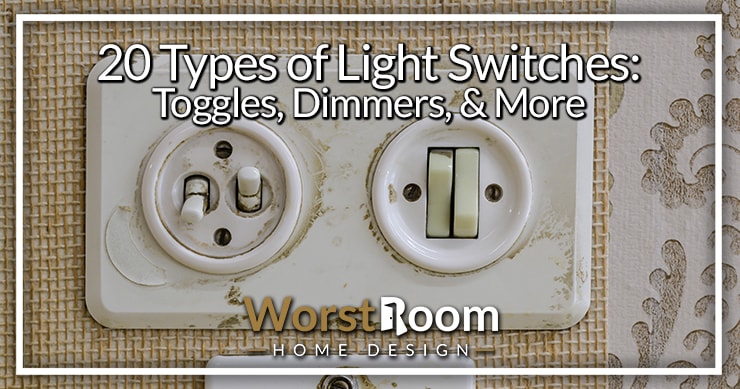
There's quite a few types of light switches out there, yet most of us have only seen two or three in our entire lifetimes. And these aren't even the coolest or best available, just the cheapest!
We have all come across the traditional toggle switches and even the sleek, modern rocker switches. And dimmer switches help set the mood for successful romantic date nights at home.
Technology has progressed a lot since the first light switch was invented by John Henry Holmes in 1884. Today, the functions of a switch aren't just restricted to switching a light on or off. There are so many designs and technologies to choose from when it comes to getting a light switch.
20 Types of Light Switches
Here are 20 different light switches to choose from. Each of the light switch styles have their own pros and cons despite doing the same simple job, though understanding how light switches work isn't as simple. A simple light switch is easy to understand, but a 3-way or 4-way light switch is a bit more technical. But unless you're doing that work yourself, don't worry about it. Let's dig in.
1) Toggle Switch
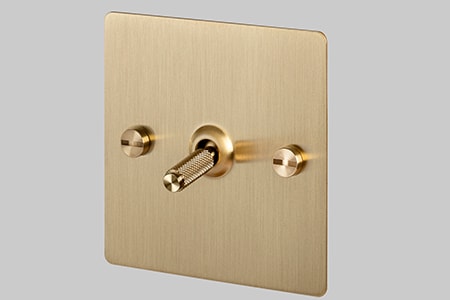
The toggle switch is a design patented by William J. Newton and Morris Goldberg in 1916. These switches are manually operated like most others and are extremely simple to use.
The toggle switch has a small handle that sticks out a little from the switch box. This switch is in the form of a lever that moves up and down through a small arc.
Switch covers can be used so that the switches don’t snag on clothing or accidentally switch off. Handle extensions can be attached to the toggles handles that are too small to make them easier to use.
2) Decorative or Rocker Switch
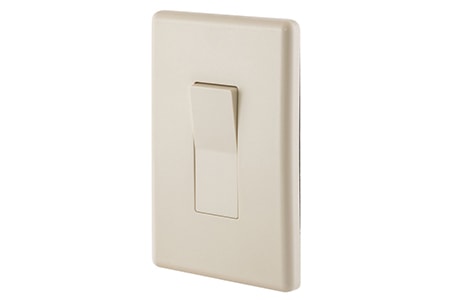
Rocker switches are flat switches that occupy a larger surface area. They only stick out minimally from the wall, so they don’t snag on clothes. They're called decorative switches in the US.
They function the same as a toggle switch but they look more appealing. They're commonly used in homes and residential areas.
Rocker switches are more common than toggle switches in Europe, Hong Kong, Malaysia, Singapore, and India. They're easy to use and easy on the eyes too! I personally love these light switch types as they're easy for little kids to use.
3) Single-Pole Switch
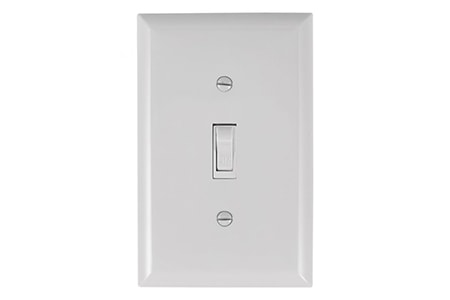
Most switches in your home are single-pole switches. They're used to operate devices that consume up to 120 V of power. They're easily the most common types of light switches, the ones we've seen the most in our lives.
They're used to turn a light on and off from a single location. Most single-pole switches have on and off markings on the toggle switch, though if they don't, up usually means on and down means off, unless you've been in a situation where someone installed one upside down. That's always annoying.
4) Double-Pole Switch
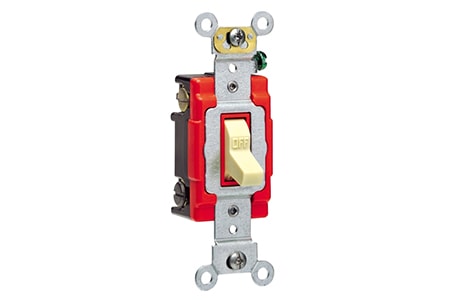
They are similar to single-pole switches as they only let you operate two connections from a single location. They're more commonly used in factories than in residential settings.
These are used for higher power loads or currents. They can handle devices that operate on up to 240 V. These switches are ideal for heating appliances, motors, and machinery.
Compared to the single-pole switch, these have four brass terminals instead of two and a ground terminal in case there's a short in the circuit.
5) Pole Receptacle Combo Switch
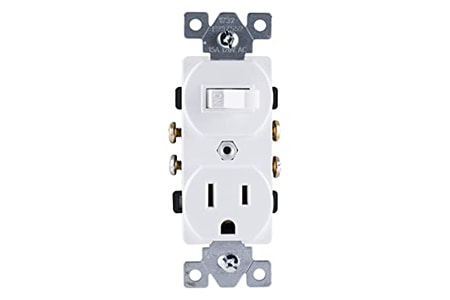
These are switches that combine a power outlet along with the switch. You don’t need to rewire or install another switch box for a power outlet.
It's a functional design that saves time and space. Combination switches make use of the space taken up by the switch box more efficiently. They're usually installed in kitchens and bathrooms.
6) Dimmable Switch
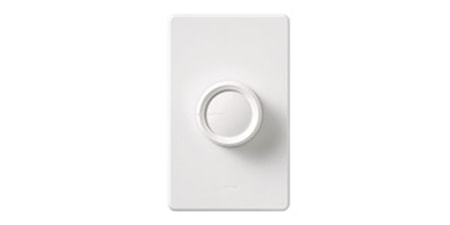
Dimmable switches are used to control the intensity or brightness of lights. They're usually used to create mood lighting, especially if you have installed accent lights.
Dimmable switches are usually rotary switches. The knob is used to control the amount of current flowing to the bulb and this will help adjust the brightness. You use them by rotating them left and right, and to turn them off you rotate all the way to the left and will feel a click.
Dimmable switches are also available in the form of touch switches. These switches will let you swipe the switch plate and adjust the brightness. Just make sure you use compatible types of light bulbs with these light switches.
7) Push-Button Light Switch
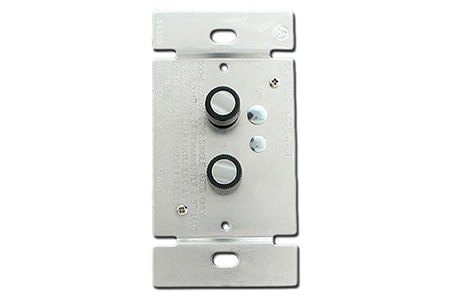
A push-button light switch was one of the earliest light switch types to be used. This older model is still in use today because it's a design that is simple and easy to use.
The two main kinds of push-button switches are ones that stay pushed down after you press it and ones that return to their default position after pressing. Both offer the same functionality, you can choose whichever you find more appealing.
Vintage push-button switch boxes are used as styling elements by interior designers as a curiosity, but most stick with the single-pole types of light switches. You find a variation of these in garages to open and close the garage door or garage door alternatives.
8) Proximity Light Switch
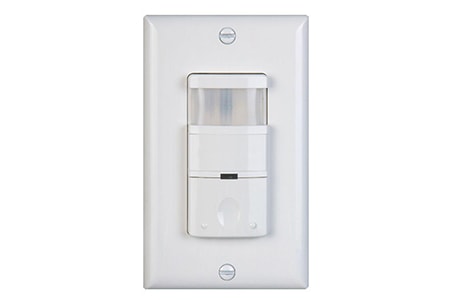
Proximity light switches are great for energy conservation. These switches use sensors to detect the presence of people in a room, close to the detector. They switch on automatically when they detect people in the room and turn off the lights when people leave the room after a little time.
If you're someone who always forgets to turn off the lights when leaving rooms, proximity switches can help you save money and conserve electricity. It's a minor convenience that can save a lot of time, too.
9) Selector Light Switch
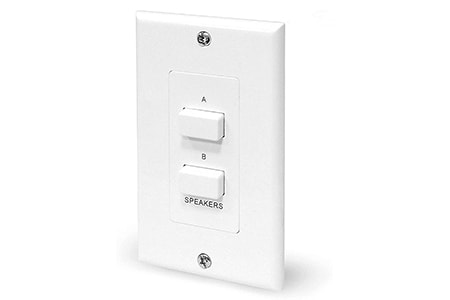
Selector light switches let you switch between multiple light settings easily. They're generally used when one system has different colored lights that you can choose from, in terms of brightness. This is great with complex types of light fixtures where a single one is used to illuminate one room but with various settings.
These light switch styles usually come in the form of rotary switches. The dial lets you switch between different modes. Some selector switches can also use multiple push buttons for each setting on the light, but these are annoying and confusing, typically.
10) Photoelectric Light Switch
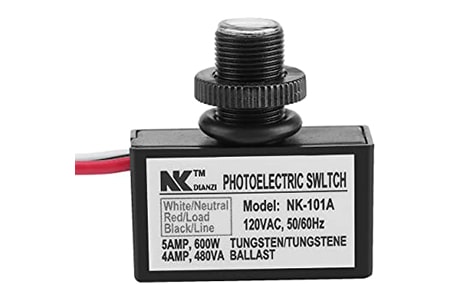
Photoelectric light switches come equipped with a sensor that detects the level of light, particularly outdoors. The lights will be turned on when the sensors detect the level of light reducing outside.
These are the kinds of switches commonly used for street lights. You can also use photoelectric switches in your backyards, porches, or other outdoor areas on your property.
11) Motion-Activated Light Switches
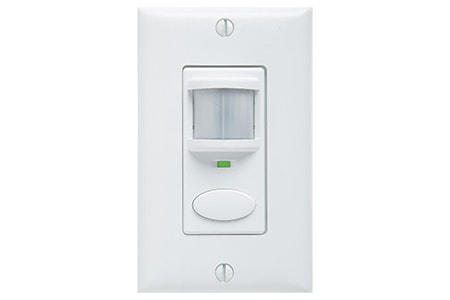
These switches automatically turn on the lights when the sensors in the switch detect movement. These sensors either detect changing sound wave patterns or visually detect body heat from humans and animals.
Some switches can either turn on or turn off lights whereas most can do both. Motion-activated switches are usually installed for security purposes. Setting up these lights in yards or porches can deter burglars and scare them off.
If you’ve watched one too many scary movies and are afraid of wandering into dimly lit spaces alone, you can also install motion-activated lights in your garage or basement. You can even hook them up to switched outlets so you can automatically turn on your various types of lamps.
12) Sound-Activated Light Switch
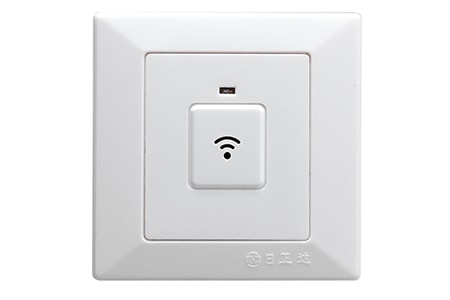
These are the switches that you see in movies and TV shows that can be switched on or off using a clap of your hands. These switches detect sound. Apart from claps, they can also be controlled using snaps or knocks.
You don’t have to get up or walk to the switchboard to control the lighting making them convenient and easy to use, especially from the bed.
13) Illuminated Switch
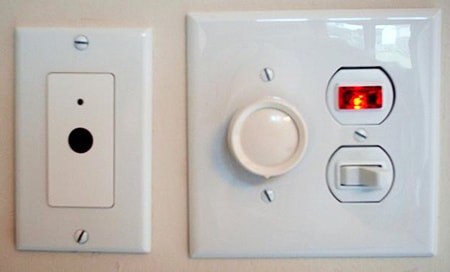
Illuminated switches were introduced in the 1950s and became popular fixtures in households. The main purpose of these switches is to let people find the switchboards in the dark.
The surface of the switch will have a small neon lamp or tiny types of LED lights. The in-built illuminating source is powered by the current passing through the circuits that these switches control.
People often install these in the bathroom and kitchen, since they provide just enough light to act as a night light. This helps you navigate your way through the house more safely without needing to turn a light all the way on.
14) Australian Rocker Switches
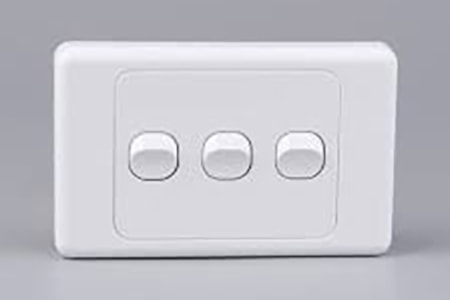
Australian rocker switches are a smaller variant of the rocker switch. They're the standard household switches used in Australia and New Zealand, hence the name.
The advantage of these types of switches is that they're compact and can be installed even in spaces only as wide as a door frame.
Almost six switch mechanisms can be installed in the same space taken up to install one or two regular sized rocker or toggle switch mechanisms.
15) Vandal Resistant Switch
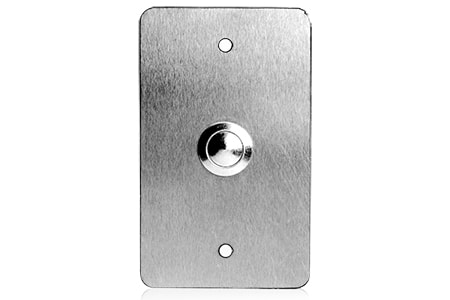
These switches are also known as vandal-proof switches. These types of light switches are usually installed outdoors in apparatuses used by the general public such as pedestrian crossing signals or vending machines.
They're designed to tolerate heavy use and even abuse. They're also resistant to dirt and moisture. These are generally used to control voting machines, power tools, and security alarm systems.
Vandal resistant switches are protected by thick stainless steel or heavy-duty plastic casings. These aren't different light switches on the inside. It's the outside that makes them unique.
16) Mercury Switch
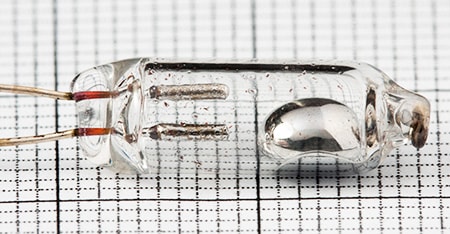
Mercury switches are mainly used for home lighting solutions. They're called "quiet switches". Unlike spring-loaded toggle switches, they don't snap loudly when connecting circuits.
A glass capsule containing a small amount of mercury acts as the connecting link between two circuits. If you want different kinds of light switches, these definitely provide the best conversation starter topics.
17) Pull Chain or Pull Cord Switch
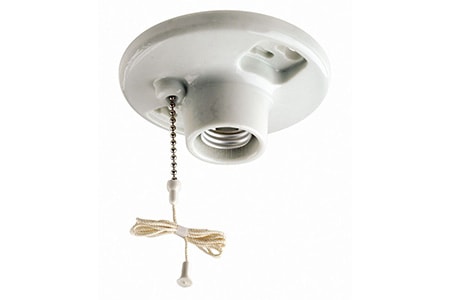
A pull chain switch is operated by pulling a chain or cord. The chain is attached to a toggle switch. They're usually used to operate ceiling lights installed in basements or garages, though you see them on ceiling fans and ceiling fan alternatives frequently.
If the cord is made of insulating material, they're safe to use in damp environments like a musty basement. Usually it's a beaded metal cord or a cloth rope.
18) Touch-Plate Switch
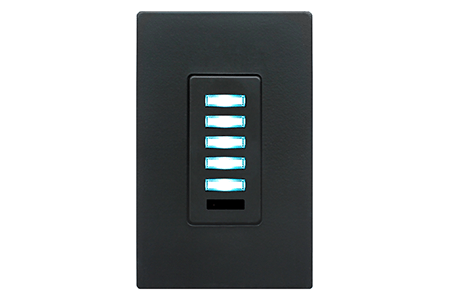
Touch-plate switches are electronic switches that can be operated by touching the switch plate. They don't have any moving parts like a toggle or rocker switch.
These are also considered quiet switches as there are no snapping parts involved in controlling the lights. You simply touch them once to turn them on and again to turn them off.
19) Wireless Light Switch
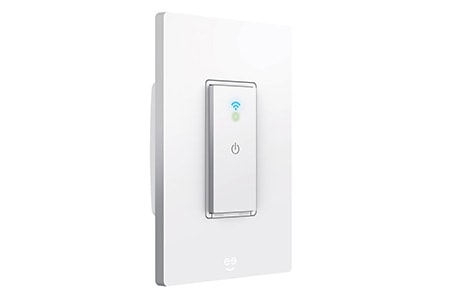
Wireless light switches can be controlled by handheld transmitters. They make use of radio transmission to operate.
With improvements in technology you don’t even need a separate remote for these lights, they can even be controlled by Bluetooth and Wi-Fi from your smartphones. Many of these smart switches offer other capabilities like dimming and color selection.
20) Multiway Switches
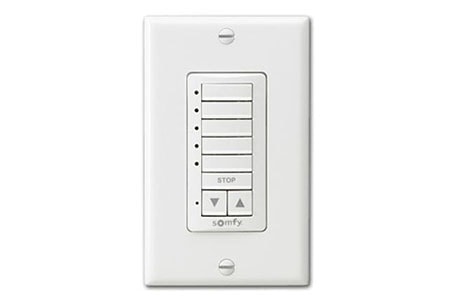
Multiway switches can be used to control circuits from different locations. These switches use additional contacts and wiring to control a single light from multiple locations.
Multiway switches are commonly used to control the lighting installed in long hallways or stairways. These are extremely convenient. My parents have one at the bottom of the basement staircase to control all the lights installed in their drop ceiling alternatives and they're a huge time saver.
Which Types of Light Switches Do You Like?
Light switches usually last for decades after they have been installed, so they're a long term investment. Now that you know the scope of a simple light switch, choose the types of light switches that suit your home and your purpose. Or just splurge on something fun.
You'll Also Enjoy:
- 11 Types of Toilets to Fit Your Bathroom & Look Amazing
- These Crown Molding Alternatives Save Money & Time & Look as Good
- 9 Types of Water Heaters for Every Family Size & Budget
- 28 Kitchen Sink Ideas to Impress While Best Utilizing Your Space
- 7 Washer & Dryer Pedestal Alternatives You Probably Already Have



